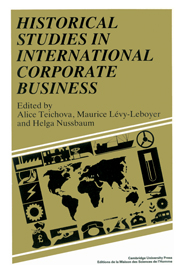Book contents
- Frontmatter
- Contents
- Preface
- 1 Introduction: multinational enterprise
- 2 History, the social sciences and economic ‘theory’, with special reference to multinational enterprise
- 3 The changing form of multinational enterprise expansion in the twentieth century
- 4 Electrical research, standardisation and the beginnings of the corporate economy
- 5 The nature of multinationals, 1870–1939
- 6 International price maintenance: control of commodity trade in the 1920s
- 7 Financial operations of US transnational corporations: development after the Second World War and recent tendencies
- 8 Multinational enterprise – financing, trade, diplomacy: the Swedish case
- 9 Foreign penetration of German enterprises after the First World War: the problem of Überfremdung
- 10 International industrial cartels, the state and politics: Great Britain between the wars
- 11 Vickers and Schneider: a comparison of new British and French multinational strategies 1916–26
- 12 J. & P. Coats Ltd in Poland
- 13 Multinationals and the French electrical industry, 1889–1940
- 14 The Japanese cotton spinners' direct investments into China before the Second World War
- 15 Mitsui Bussan during the 1920s
- 16 Japanese business in the United States before the Second World War: the case of Mitsui and Mitsubishi
- 17 The state and private enterprise in the United States–Latin American oil policy
- 18 Transnational corporations and the denationalization of the Latin American cigarette industry
- 19 Summary: Reflections on the papers and the debate on multinational enterprise: international finance, markets and governments in the twentieth century
- Index of names
- Index of firms
- Index of subjects
2 - History, the social sciences and economic ‘theory’, with special reference to multinational enterprise
Published online by Cambridge University Press: 04 August 2010
- Frontmatter
- Contents
- Preface
- 1 Introduction: multinational enterprise
- 2 History, the social sciences and economic ‘theory’, with special reference to multinational enterprise
- 3 The changing form of multinational enterprise expansion in the twentieth century
- 4 Electrical research, standardisation and the beginnings of the corporate economy
- 5 The nature of multinationals, 1870–1939
- 6 International price maintenance: control of commodity trade in the 1920s
- 7 Financial operations of US transnational corporations: development after the Second World War and recent tendencies
- 8 Multinational enterprise – financing, trade, diplomacy: the Swedish case
- 9 Foreign penetration of German enterprises after the First World War: the problem of Überfremdung
- 10 International industrial cartels, the state and politics: Great Britain between the wars
- 11 Vickers and Schneider: a comparison of new British and French multinational strategies 1916–26
- 12 J. & P. Coats Ltd in Poland
- 13 Multinationals and the French electrical industry, 1889–1940
- 14 The Japanese cotton spinners' direct investments into China before the Second World War
- 15 Mitsui Bussan during the 1920s
- 16 Japanese business in the United States before the Second World War: the case of Mitsui and Mitsubishi
- 17 The state and private enterprise in the United States–Latin American oil policy
- 18 Transnational corporations and the denationalization of the Latin American cigarette industry
- 19 Summary: Reflections on the papers and the debate on multinational enterprise: international finance, markets and governments in the twentieth century
- Index of names
- Index of firms
- Index of subjects
Summary
The foreign (or international) firm, the multinational (or transnational) corporation, the multinational enterprise, are among the many names applied to the same complex economic organisation – an organisation which is neither a firm nor a corporation in the normal economic or legal sense, which may be incorporated domestically and only partly foreign-owned, which nevertheless is not international since it normally has a single nationality (although there are the few rare cases where its parentage is indeed multinational). It is not entirely within the jurisdiction of any single government. To the extent that the multinational enterprise dominates major international industries it has its roots in the industrialised developed world and thus early came to express in many ways in its own being both the pervasive interdependence of countries and their drive for independence, the positive and negative aspects of economic imperialism, a beacon for economic development and a siren call to a false path.
To describe it or to attempt ‘to penetrate its nature’ while looking at it from the point of view of any one of the social sciences, including economic history, is an exercise reminiscent of that of the proverbial blind men describing the elephant some part of which each touches: the observations are all valid but even when all are taken together the ‘nature’ of ‘the’ elephant is still not understood.
- Type
- Chapter
- Information
- Publisher: Cambridge University PressPrint publication year: 1989
- 8
- Cited by



